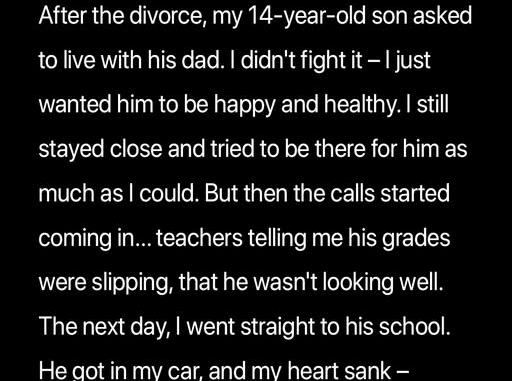
When Claire’s teenage son moved in with his father, she thought she was doing the right thing. But when her son’s silence grew louder than any words, she followed her instincts — and uncovered a painful truth. This is a quiet story about what it means to show up, no matter what.
When my 14-year-old son, Mason, asked if he could live with his dad after our divorce, I agreed — not because it was easy, but because I didn’t want to get in the way of a father-son relationship that still had time to heal.
Mason still stayed with me on weekends. I told myself he was only a few blocks away, that this wasn’t permanent. That it was a gift — the space to connect with his dad.
Eddie had always been the “fun” parent — spontaneous, silly, a pancake-at-midnight kind of guy. And it seemed like he wanted to step up.
So I said yes.
At first, things seemed fine. Mason would text, send goofy photos, share little moments of life in his new space. I missed him terribly, but I reassured myself: He’s happy. He’s safe. This is good.
But over time, the messages slowed. Then stopped.
And the first phone call I got wasn’t from Mason — it was from one of his teachers.
“He’s been missing homework,” she said. “That’s not like him.”
Another teacher echoed the same concern. “He’s here, but it feels like he’s not really present.”
Then came the hardest one — his math teacher called to say Mason had been caught cheating. That word — cheating — didn’t sound like my son. But the teacher said he looked… lost.
That’s when it hit me. Something wasn’t right.
I tried to reach him — calls, texts, voicemails. Nothing. Eventually, I phoned Eddie. I tried to be neutral, gentle — not accusatory. But his response?
“He’s just being a teenager. You’re overreacting.”
That word — overreacting — triggered something in me. I’d heard it before. Years ago, when Mason was a crying newborn and I was drowning in exhaustion, Eddie dismissed my concerns with that same shrug.
This time, though, I couldn’t ignore my gut.
One rainy Thursday, I went to Mason’s school without asking. I parked where I knew he’d see me. When the bell rang, he came out alone, head down, shoulders heavy.
He got in the car without a word. His clothes were soaked. His eyes were hollow. My heart broke.
“I can’t sleep, Mom,” he finally whispered. “I don’t know what to do.”
What he shared next was hard to hear.
After Mason moved in, Eddie lost his job. He hadn’t told anyone. He tried to keep things looking normal, but behind the scenes, everything was falling apart. No food. No heat. No lights. Eddie was gone most nights — supposedly at interviews — but sometimes he didn’t come home at all.
Mason had been surviving on crackers, dry cereal, and spoonfuls of peanut butter. He was doing laundry on his own. Studying in the dark. And all the while, he was hiding it — trying to protect both of us from the truth.
He didn’t want to disappoint anyone. He didn’t want me to think less of his dad. Or of him.
He wasn’t rebelling. He was surviving.
I took him home that night. Quietly. No arguments. No legal battles. Just instinct.
He slept for nearly 14 hours. And the next morning, over breakfast, he asked for his old robot mug — the chipped one I’d saved all these years. I found it, handed it to him, and stepped into the hallway so he wouldn’t see me cry.
He started therapy soon after. I let him choose the therapist. The pace. The process. I didn’t rush. I didn’t pry. I just made home a place he could breathe again.
I left notes on his door every day.
“You’re doing better than you think.”
“I’m proud of you.”
“You’re not alone.”
At first, he ignored them. But weeks later, I found one waiting for me — scribbled on a sticky note: “Thanks for seeing me, even when I didn’t say anything.”
That’s when I knew he was coming back.
Little by little, Mason returned to himself. He joined robotics club. He rebuilt a model bridge that collapsed immediately — and laughed. And that laugh was everything.
At the end of the year, his teacher emailed: “You’ll want to be at the assembly.”
They called his name for “Most Resilient Student.”
He looked out into the crowd, found me, then lifted one hand toward Eddie in the back row.
It wasn’t perfect, but it was something.
Mason lives with me now. His room’s a mess again — the good kind. Loud music, socks on the floor, energy in the air. I find sticky notes above his desk now:
“Remember to breathe.”
“You’re not alone, Mase.”
He still teases me about my phone. He still asks for help with homework. And every time he asks, I stop what I’m doing — not because I can fix everything, but because I want him to know I’m here.
Always.
Because sometimes love isn’t quiet or polite. Sometimes love is loud. It shows up. It dives in. And it never lets go.